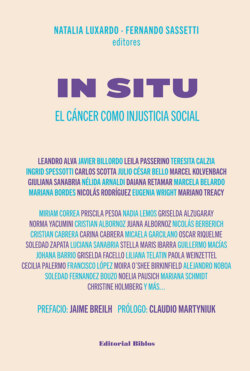Читать книгу In situ. El cáncer como injusticia social - Natalia Luxardo - Страница 36
На сайте Литреса книга снята с продажи.
Referencias
ОглавлениеALMEIDA FILHO, N. de (2004), “Modelos de determinação social das doenças crônicas não-transmissíveis”, Ciência & Saúde Coletiva, 9 (4). https://doi.org/10.1590/S1413-81232004000400009.
– (2009), “A problemática teórica da determinação social da saúde (nota breve sobre desigualdades em saúde como objeto de conhecimento)”, Saúde em Debate, 33 (83).
– (2020), “Desigualdades en salud: nuevas perspectivas teóricas”, Salud Colectiva, 16. http://doi.org/10.18294/sc.2020.2751.
ARCAYA, M. C., A. L. ARCAYA y S. V. SUBRAMANIAN (2015), “Inequalities in health: definitions, concepts, and theories”, Global Health Action, 8 (1): 27106. https://doi.org/10.3402/gha.v8.27106.
BAER, H., M. SINGER y J. JOHNSEN (1986), “Toward a Critical Medical Anthropology”, Social Science & Medicine, 23 (2): 95-98. https://doi.org/10.1016/0277-9536(86)90358-8.
BENACH, J. y C. MUNTANER (2008), Desigualdades en salud: una epidemia que podemos evitar. https://www.rebelion.org/noticia.php?id=72000.
BRAVEMAN, P. (2006), “Health disparities and health equity: Concepts and measurement”, Annual Review of Public Health, 27 (1): 167-194. https://doi.org/10.1146/annurev.publhealth.27.021405.102103.
BREILH, J. (2006), Epidemiología crítica: ciencia emancipadora e interculturalidad, Río de Janeiro, Fiocruz.
CANADIAN COUNCIL ON SOCIAL DETERMINANTS OF HEALTH (2015), A Review of Frameworks on the Determinants of Health. http://ccsdh.ca/images/uploads/Frameworks_Report_English.pdf.
COHEN, B. y S. G. MARSHALL (2017), “Does public health advocacy seek to redress health inequities? A scoping review”, Health and Social Care in the Community, 25 (2): 309-328. DOI: 10.1111/hsc.12320.
DAHLGREN, G. y M. WHITEHEAD (1991), Policies and Strategies to Promote Social Equity in Health. Background document to WHO – Strategy paper for Europe. https://core.ac.uk/download/pdf/6472456.pdf.
LIEBERSON, S. (1985), Making It Count: The Improvement of Social Research and Theory, University of California Press.
LINK, B.G. y J.C. PHELAN (2001), “Conceptualizing stigma”, Annual Review of Sociology, 27: 363-385.
LÓPEZ ARELLANO, O., J.C. ESCUDERO y L.D. CARMONA MORENO (2008), “Los determinantes sociales de la salud: una perspectiva desde el Taller Latinoamericano de Determinantes Sociales sobre la Salud”, Medicina Social, 3 (4). http://www.medicinasocial.info/index.php/medicinasocial/article/view/260.
MARCHIORI BUSS, P. (2008), “Una introducción al concepto de promoción de la salud”, en D. Czeresnia y C. Machado de Freitas, Promoción de la salud: conceptos, reflexiones y tendencias, Buenos Aires, Lugar Editorial, 19-46.
MARINER, W.K. (2016), “Beyond lifestyle: Governing the social determinants of health”, American Journal of Law & Medicine, 42.
MARMOT, M. (2017), “Social justice, epidemiology and health inequalities”, European Journal of Epidemiology, 32 (7). https://doi.org/10.1007/s10654-017-0286-3.
– y A. IRWIN (2010), “A conceptual framework for action on the social determinants of health: Social determinants of health”, Discussion Paper 2 (Policy and Practice). https://www.who.int/social_determinants/corner/SDHDP2.pdf.
MARMOT, M.G., S. STANSFELD, C. PATEL, F. NORTH, J. HEAD, I. WHITE, E. BRUNNER, A. FEENEY y G.D. SMITH (1991), “Health inequalities among British civil servants: The Whitehall study”, The Lancet, 337 (8754): 1387-1393.
MIKKONEN, J. y D. RAPHAEL (2010), Social Determinants of Health: The Canadian Facts, Toronto, York University School of Health Policy and Management. http://www.thecanadianfacts.org.
NATIONAL COMMITTEE ON VITAL HEALTH STATISTICS (2002), Shaping a Health Statistics Vision for the 21st Century, Department of Health and Human Services Data Council. Final Report.
NCCDH (2013), Let’s Talk: Universal and Targeted Approaches to Health Equity, National Collaborating Centre for Determinants of Health, St. Francis Xavier University. http://nccdh.ca/images/uploads/Approaches_EN_Final.pdf.
OMS (2011), Rio Political Declaration on Social Determinants of Health, Río de Janeiro, World Health Organization. https://www.who.int/sdhconference/declaration/Rio_political_declaration.pdf?ua=1.
OMS-CDSS (2008), Closing the Gap in a Generation: Health Equity through Action on the Social Determinants of Health. Final Report of the Commission on Social Determinants of Health. https://www.who.int/social_determinants/thecommission/finalreport/en.
OPS (2002), La salud en las Américas, Washington, Organización Panamericana de la Salud.
OTTAWA CHARTER FOR HEALTH PROMOTION (1986), http://www.euro.who.int/__data/assets/pdf_file/0004/129532/Ottawa_Charter.pdf?ua=1.
ØVERSVEEN, E., T. HÅVARD, C. RYDLAND (2017), “Rethinking the relationship between socio-economic status and health: Making the case for sociological theory in health inequality research”, Scandinavian Journal of Public Health, 45: 102-112.
PICKET, K. E., y R. G. WILKINSON (2015), “Income inequalities and health: A systematic review”, Social Science & Medicine, 128: 316-326. DOI: 10.1016/j.socscimed.2014.12.031.
RAPHAEL, D. (2015), “The political economy of health: A research agenda for addressing health inequalities in Canada”, Canadian Public Policy/Analyse de politiques. https://www.utpjournals.press/doi/pdf/10.3138/cpp.2014-084.
SOLAR, O. y A. IRWIN (2010), A Conceptual Framework for Action on the Social Determinants of Health. Social Determinants of Health Discussion Paper 2, Geneva, World Health Organization. http://www.who.int/sdhconference/resources/ConceptualframeworkforactiononSDH_eng.pdf.
WING, S. (2016), “Science for reducing health inequalities emerges from social justice movements”, New Solutions. A journal of environmental and occupational health policy, 26 (1).
* Una primera versión reducida de este capítulo ha sido publicada en S.E. Sustas, S.A. Tapia, M.P. Venturiello, (comps.), Investigación e intervención en salud, Buenos Aires, Teseo, 2020.
** Candela Heredia es trabajadora social. Becaria doctoral Conicet en el Doctorado de Antropología (UBA). Instituto Gino Germani. candelaheredia@gmail.com.
Cecilia Palermo es socióloga. Becaria doctoral UBA en el Doctorado de Ciencia Sociales. Instituto Gino Germani. cecipalermo@gmail.com.
Javier Billordo es licenciado en Bioingeniería (Universidad Nacional de Entre Ríos). Casa de Atención y Acompañamiento José D. Rodríguez. javierbillordo12@gmail.com.
Eugenia Brage es doctora en Antropología (UBA). Centro de Estudios de Metropole (CEM). Universidade de São Paulo. eugebrage@gmail.com.
Leandro Alva es licenciado en Enfermería Comunitaria. Enfermero en el Centro de Salud Gobernador Uranga, Aldea Brasilera (Diamante, Entre Ríos). leandroalva@yahoo.com.ar.
Teresita Calzia es licenciada en Trabajo Social por la Universidad Nacional de Entre Ríos. guadalupecalzia@hotmail.com.
